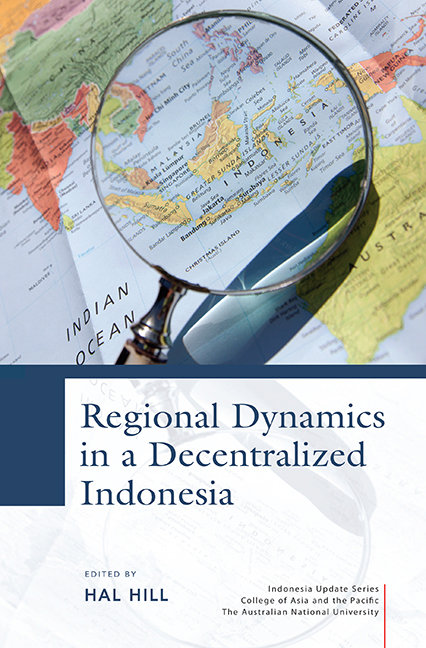Book contents
- Frontmatter
- Dedication
- Contents
- Tables
- Figures
- Contributors
- Acknowledgments
- Glossary
- Map of Indonesia
- 1 An introduction to the issues
- PART 1 HISTORICAL, ECONOMIC, POLITICAL AND SOCIAL PATTERNS
- PART 2 DECENTRALIZATION AND GOVERNANCE
- PART 3 LOCAL-LEVEL PERSPECTIVES
- PART 4 MIGRATION, CITIES AND CONNECTIVITY
- PART 5 CHALLENGES FOR INDONESIA'S PERIPHERY
- 17 The political impact of carving up Papua
- 18 Development in Papua after special autonomy
- 19 Special autonomy, predatory peace and the resolution of the Aceh conflict
- 20 Aceh's economy: prospects for revival after disaster and war
- Author index
- Subject index
- INDONESIA UPDATE SERIES
17 - The political impact of carving up Papua
from PART 5 - CHALLENGES FOR INDONESIA'S PERIPHERY
Published online by Cambridge University Press: 21 October 2015
- Frontmatter
- Dedication
- Contents
- Tables
- Figures
- Contributors
- Acknowledgments
- Glossary
- Map of Indonesia
- 1 An introduction to the issues
- PART 1 HISTORICAL, ECONOMIC, POLITICAL AND SOCIAL PATTERNS
- PART 2 DECENTRALIZATION AND GOVERNANCE
- PART 3 LOCAL-LEVEL PERSPECTIVES
- PART 4 MIGRATION, CITIES AND CONNECTIVITY
- PART 5 CHALLENGES FOR INDONESIA'S PERIPHERY
- 17 The political impact of carving up Papua
- 18 Development in Papua after special autonomy
- 19 Special autonomy, predatory peace and the resolution of the Aceh conflict
- 20 Aceh's economy: prospects for revival after disaster and war
- Author index
- Subject index
- INDONESIA UPDATE SERIES
Summary
INTRODUCTION
Administrative fragmentation, through the process known as pemekaran, is transforming political dynamics in Papua, strengthening clan identities, generating a new assertiveness among elected Papuan officials and nurturing new conflicts. Papua has undergone greater administrative division than any other area of Indonesia. What in 1999 was a single province with 10 subprovincial districts or municipalities (kabupaten/ kota) has become two provinces, Papua and West Papua, with 42 districts and municipalities, and further new units in process – all of this taking place in one of the poorest and most violence-wracked regions of Indonesia.
Papua is historically and culturally different from the rest of Indonesia. Whereas the rest of the former Dutch East Indies secured independence in 1949, the western half of the island of New Guinea was incorporated into Indonesia only in 1969 following a controversial United Nations-supervised referendum. It has been home to an active independence movement ever since. It is culturally Melanesian, not Malay, and it has over 200 indigenous ethnic groups. In addition, a large migrant population from the rest of Indonesia has grown up over the last several decades, including migrants from both Java and elsewhere as part of an official resettlement program during the 1970s and 1980s, as well as many others who came on their own to trade or to take jobs in the civil service. In 2001, the Indonesian government granted Papua ‘special autonomy’ in the hope that this would weaken the independence movement, but whatever good will might have emerged from this initiative was destroyed two years later when, without consultation, the government divided the province first into three, then back into two, provinces. In the decade since special autonomy came into force, there has been limited progress on devolving political powers that would be significantly greater than those enjoyed by other Indonesian provinces; the main impact has been to flood Papua and West Papua with cash, much of which has disappeared through corruption. Both provinces remain at or near the bottom of the country's Human Development Index (HDI), despite huge wealth from various extractive industries and, increasingly, palm oil.
It is in this context that the ‘blossoming’ (pemekaran) of administrative units is taking place today, without any clear strategy or development logic, other than the tired refrain of ‘bringing government closer to the people’.
- Type
- Chapter
- Information
- Regional Dynamics in a Decentralized Indonesia , pp. 409 - 432Publisher: ISEAS–Yusof Ishak InstitutePrint publication year: 2014



